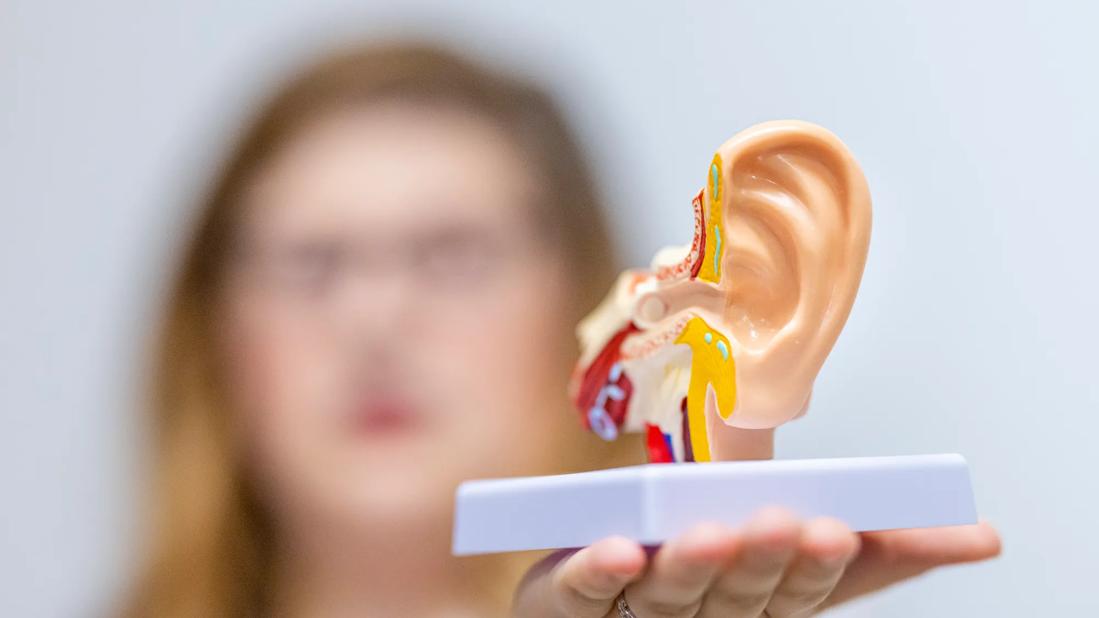Hearing implant program continues to grow

By Sarah Sydlowski, AuD, PhD, and Erika Woodson, MD
Advertisement
Cleveland Clinic is a non-profit academic medical center. Advertising on our site helps support our mission. We do not endorse non-Cleveland Clinic products or services. Policy
Since 1983, the Cleveland Clinic Hearing Implant Program (HIP) has made essential contributions to the advancement of cochlear implantation (CI) in the United States. From involvement in some of the earliest CI multicenter studies1 to modern day development of CI assessment materials,2 the members of past and present HIP teams have focused on offering evidence-based, team-oriented hearing healthcare to our more than 1,300 CI recipients and their families.
In this evolving field, we have challenged the status quo and worked to optimize care delivery and patient outcomes. The HIP team is particularly proud of advancements in the following areas:
Maintaining cochlear structure and function through gentle surgical technique and application of the latest technological advancements has allowed our team to be a national leader in hearing preservation. Our audiologists apply best practices to optimize the benefit provided by retained residual hearing. Verification of amplification, routine aided speech testing, a collaborative approach to bimodal fittings, and encouragement of intensive auditory training help ensure that our patients have every opportunity to succeed.
Our program also aims to care for the patient’s overall hearing healthcare. Our implant audiologists provide comprehensive management of each patient’s electric and acoustic hearing needs. In addition to regular diagnostic testing of hearing and auditory training guidance, this includes recommending and managing acoustic components, contralateral hearing aids and assistive devices. Our surgeons, audiologists and auditory therapists work collaboratively to manage patient expectations and outcomes.
Advertisement
Making the significant advantages of CI available to every patient who could benefit is a primary focus of our team. Team members participated in a continuous improvement project and implemented an internal education program for referring physicians and audiologists that has increased CI evaluations by more than 30 percent. In addition, team members have presented locally and nationally on best practices for identifying CI candidates.
We care for some of the most complex hearing loss cases in the country, implanting candidates ranging in age from 9 months to 94 years old. We also approve candidates who are medically complex, including those with retrocochlear pathologies, mitochondrial disorders and even some who have been on transplant waiting lists.
CI is not a last resort. Our team offers CI to patients as soon as they could potentially benefit from the technology. As a result, our recipients include patients with single-sided deafness, asymmetric or fluctuating hearing loss and significant residual hearing.
With increasing volumes due to expansion of candidacy criteria and improved identification of appropriate patients, our team has considered novel approaches to improving access to our program. In late 2017, we introduced a CI candidacy evaluation shared medical appointment that allows patients to receive extensive information on the technology, meet with a surgeon and complete aided speech recognition screening while benefiting from the experiences of others in similar situations.
Advertisement
Finally, we strive to be responsible stewards of healthcare resources. Our program is committed to being thoughtful about remaining sustainable so that we can continue to grow and accommodate more patients who can benefit from this life-changing technology.
Dr. Sydlowski is Audiology Director of the Hearing Implant Program at Cleveland Clinic with specialty certification in cochlear implants. Dr. Woodson is Medical Director of the Hearing Implant Program, and a staff physician in the Head and Neck Institute and Ella Burkholdt Brain Tumor Gamma Knife Center.
1. Kinney SE. (1979). Current status of an implantable cochlear prosthesis. Artif Organs, 3(4): 379-82.
2. Spitzer JB, Sandridge SA, Newman CW, Ghent RM, Sydlowski SA. (2015). A Speech Perception Test in Simulated Reverberation Conditions. American Journal of Audiology, 24, 169-177.
Advertisement
Advertisement

Analysis of HNSCC patients shows HPV status to be predictive of higher abundance of oncobacteria within the tumor

Case study illustrates the potential of a dual-subspecialist approach

Evidence-based recommendations for balancing cancer control with quality of life

Study shows no negative impact for individuals with better contralateral ear performance

HNS device offers new solution for those struggling with CPAP

Patient with cerebral palsy undergoes life-saving tumor resection

Specialists are increasingly relying on otolaryngologists for evaluation and treatment of the complex condition

Detailed surgical process uncovers extensive middle ear damage causing severe pain and pressure.